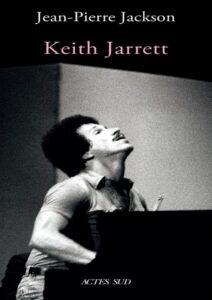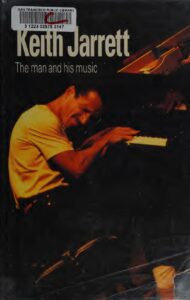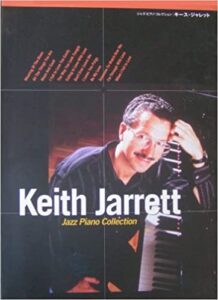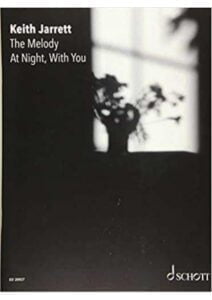Table of Contents
Come join us now, and enjoy playing your beloved music and browse through great scores of every level and styles!
Can’t find the songbook you’re looking for? Please, email us at: sheetmusiclibrarypdf@gmail.com We’d like to help you!

Happy birthday, Keith Jarrett, born on this day in 1945
Keith Jarrett: The Genius of Improvisation and Jazz Innovation
Keith Jarrett is one of the most influential and innovative pianists in the history of jazz and contemporary music. Known for his virtuosic technique, profound improvisational skills, and genre-defying compositions, Jarrett has left an indelible mark on the world of music. From his early days as a prodigy to his groundbreaking solo piano performances and collaborations with jazz legends, Jarrett’s career spans over five decades, earning him critical acclaim and a devoted global following.
This article explores Keith Jarrett’s biography, musical style, harmonic and melodic approaches, influences, legacy, major works, filmography, discography, and links to documentaries and performances of his most famous compositions.

Best Sheet Music download from our Library.
Biography
Early Life and Musical Beginnings
Keith Jarrett was born on May 8, 1945, in Allentown, Pennsylvania. A child prodigy, he began playing piano at the age of three and gave his first public recital at seven, performing works by Mozart, Bach, and Beethoven. His early exposure to classical music deeply influenced his later improvisational style, which often blends jazz with classical forms.
By his teenage years, Jarrett was already an accomplished musician, studying at the Berklee College of Music before moving to New York City in the mid-1960s. There, he quickly gained recognition as a versatile pianist, capable of playing both avant-garde jazz and traditional forms.

Please, subscribe to our Sheet Music Library.
If you are already a subscriber, please, check our NEW SCORES’ page every month for new sheet music. THANK YOU!
Rise to Fame: The Charles Lloyd Quartet and Miles Davis
Jarrett’s first major breakthrough came when he joined saxophonist Charles Lloyd’s quartet in 1966. The group’s blend of jazz, rock, and world music attracted a wide audience, and their album “Forest Flower” (1966) became a surprise commercial success.
In 1969, Jarrett was invited to join Miles Davis’ electric band, contributing to landmark albums like “Bitches Brew” (1970) and “Live-Evil (1971)”. Though Jarrett was initially hesitant about Davis’ fusion direction (preferring acoustic jazz), this experience expanded his musical vocabulary, incorporating electric keyboards and experimental textures.
The American Quartet and European Quartet
After leaving Davis’ band, Jarrett formed his “American Quartet” (with Dewey Redman, Charlie Haden, and Paul Motian), which explored free jazz, post-bop, and folk influences. Albums like “The Survivors’ Suite” (1977) showcase the group’s deep interplay and Jarrett’s evolving compositional style.
Simultaneously, he led his “European Quartet” (with Jan Garbarek, Palle Danielsson, and Jon Christensen), which had a more lyrical, ECM Records-style sound, as heard in “Belonging” (1974) and “My Song” (1978).
Solo Piano and The Köln Concert
Jarrett’s most legendary contribution to music is his solo piano improvisations. His 1975 performance in Cologne, Germany, released as “The Köln Concert”, became one of the best-selling solo jazz albums of all time. Entirely improvised, the concert demonstrated his ability to weave spontaneous melodies, rhythmic complexity, and emotional depth into a cohesive masterpiece.
Later Career and Health Challenges
In the 1980s and 1990s, Jarrett continued to record solo and with his “Standards Trio” (featuring Gary Peacock and Jack DeJohnette), reinterpreting jazz standards with unparalleled creativity. However, in the late 1990s, he was diagnosed with chronic fatigue syndrome (CFS), which forced him to take breaks from performing. Despite this, he made a triumphant return in the 2000s with new solo and trio recordings.
In 2018, Jarrett suffered two strokes that impaired his motor skills, effectively ending his performing career. However, his vast body of work remains a testament to his genius.

Musical Style and Innovations
Improvisation as Composition
Jarrett’s approach to improvisation is unique—he treats each performance as a spontaneous composition, drawing from jazz, classical, blues, folk, and world music. Unlike many jazz musicians who rely on pre-established chord changes, Jarrett often begins with a simple motif and develops it into a sprawling, multi-movement piece.
Harmonic and Melodic Language
- Modal and Tonal Exploration: Jarrett frequently shifts between modal jazz harmony (influenced by Miles Davis and John Coltrane) and tonal classical structures (like those of Bach and Bartók).
- Ostinatos and Repetition: He uses repetitive left-hand patterns (ostinatos) to create a hypnotic foundation for right-hand improvisations (e.g., “Part II” of The Köln Concert).
- Blues and Gospel Inflections: His playing frequently incorporates bluesy bends, gospel-like harmonies, and soulful phrasing (evident in “The Melody at Night, With You”).
Rhythmic Complexity

Jarrett’s rhythmic sense is highly sophisticated, blending:
- Swing and bebop phrasing (in trio settings)
- Free, rubato passages (in solo concerts)
- Odd-meter explorations (e.g., “Spiral Dance” from “Hymns/Spheres”)

Influences
Jarrett’s style is a synthesis of diverse influences:
- Jazz: Bill Evans, Art Tatum, McCoy Tyner, Ornette Coleman
- Classical: Johann Sebastian Bach, Béla Bartók, Dmitri Shostakovich
- Blues & Gospel: Ray Charles, church music from his childhood
- World Music: African rhythms, Indian ragas
Legacy
Keith Jarrett’s impact on music is immeasurable:
- Redefined solo piano improvisation, inspiring generations of musicians.
- Bridged jazz and classical in a way few others have.
- Elevated the “Standards Trio” to new heights of interplay and sensitivity.
- Pushed the boundaries of jazz, proving that spontaneity can yield profound compositions.

Major Works and Discography
Key Albums
- “The Köln Concert” (1975) – Solo piano masterpiece.
- “Facing You” (1971) – First solo studio album.
- “Belonging” (1974) – With the European Quartet.
- “Standards, Vol. 1” (1983) – First album with the Standards Trio.
- “The Melody at Night, With You” (1999) – Intimate solo recordings during his illness.
Filmography & Documentaries
- “Keith Jarrett: The Art of Improvisation” (2005) – A deep dive into his creative process.
- “Trio Live” (2007) – Performances with Peacock and DeJohnette.
Links to Documentaries and Performances
- The Köln Concert (Complete): YouTube Link
- “My Song” (Live with Jan Garbarek): YouTube Link
- “The Art of Improvisation” Documentary: Link
Keith Jarrett remains one of the most extraordinary musicians of our time. His ability to blend spontaneity with structure, jazz with classical, and emotion with intellect makes his work timeless. Though his performing days are over, his recordings continue to inspire, ensuring that his legacy endures for generations to come.
Browse in the Library:
Or browse in the categories menus & download the Library Catalog PDF:
